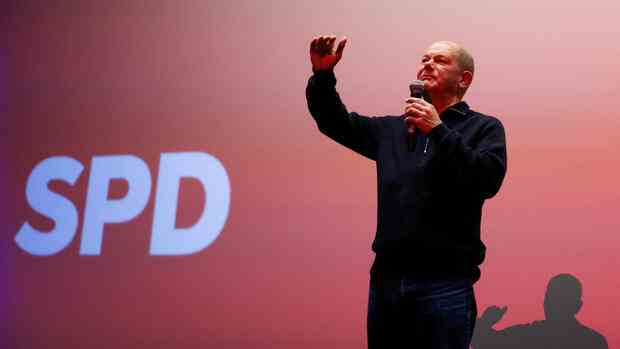The Federal Chancellor expects strong growth in the number of inhabitants in Germany.
(Photo: Reuters)
Potsdam Chancellor Olaf Scholz has dampened hopes that Russian President Vladimir Putin would back down in the war against Ukraine. “Whenever I talk to Putin, he also says very precisely that he is about conquering something,” Scholz said on Saturday in Potsdam at a citizens’ dialogue in his federal constituency. “He simply wants to conquer part of Ukrainian territory by force,” added the SPD politician.
This is the case despite high Russian losses. “We don’t know exactly how many Russian soldiers died. But it’s possible that there are 100,000.” The Russian leadership has shown brutal action before, for example in Syria or Chechnya, where they “erased an entire country”. There is no restraint with Putin. Nevertheless, despite all the differences, you have to talk to him again and again to check whether there are any changes regarding Ukraine.
Scholz defended the increasing expenditure for the Bundeswehr, which should permanently reach two percent of economic output. In earlier times of the Federal Republic’s policy of détente under SPD chancellors, the rate was even four percent. The NATO countries must be so strong that nobody dares to attack them.
In addition to spending on armaments, Scholz also wants to increase spending on research. The federal government has agreed with the states to invest 3.5 percent of economic output in research in the future. It is currently over three percent. There are hardly any large countries that would spend so much on research and development. “We want to maintain and even expand this for the future,” emphasized the SPD politician.
Top jobs of the day
Find the best jobs now and
be notified by email.
The traffic light coalition had agreed to increase the research quota, which includes public and private spending, to 3.5 percent of economic output. On Thursday, the federal government and the 16 state leaders then agreed to work together towards the 3.5 percent target by 2025. The federal states are responsible for the universities, for example.
Scholz wants to use policy competence sparingly
As part of the public dialogue, the chancellor also assured that he wanted to be economical with his directive authority in the federal government. It was necessary for him to use this option, which is enshrined in the Federal Government’s Basic Law, in the dispute over the operating times of the last nuclear power plants, “because time was of the essence,” said Scholz.
“I found it necessary, I found that many in Germany were also quite satisfied,” said the SPD politician. “But it’s not my plan to do it once a week. I can get by with normal driving.”
Scholz had formally exercised his policy competence in the dispute between the FDP and the Greens over the nuclear power plant runtimes by writing a letter to his cabinet. Such a step had previously only been made known by Chancellor Konrad Adenauer more than half a century ago.
Scholz considers an increase in the population to 90 million to be plausible
With regard to the demographic development in Germany, the Federal Chancellor expects strong growth in the number of inhabitants in Germany. “We have well over 80 million inhabitants, but that will continue to increase,” said the SPD politician. “The Federal Statistical Office has presented a calculation that is quite plausible that it will continue to grow towards 90 million,” he added.
There is also a record employment rate. By facilitating the immigration of skilled workers, the federal government wants to ensure “that we keep things running here”.
Population growth also keeps pension contributions stable. “It looks like we’re almost going to get to the end of the legislative period (2025) and won’t see any substantial increases in contributions,” said Scholz. The Chancellor had already said at the federal government’s digital summit that he expected further significant population growth in the coming years.
More: The EU Commission lets Scholz and Macron in the Hungary dispute
